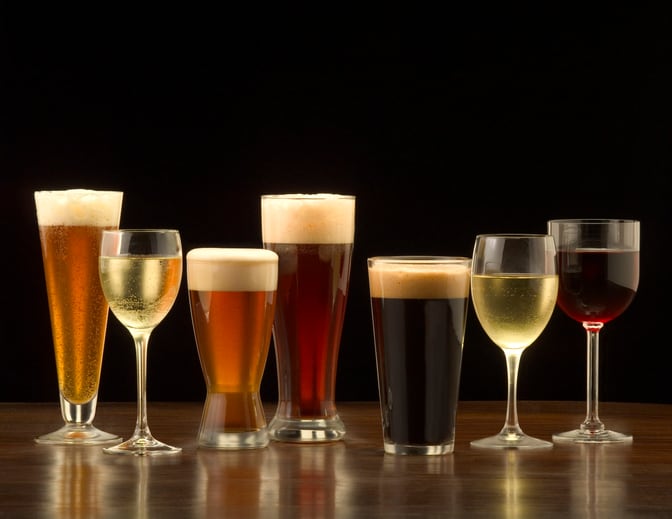The country is currently considering a raft of marketing restrictions for alcohol and is assessing whether the low and no alcohol counterparts of alcohol brands should be equally included.
While the low/no alcohol industry promotes their products as a positive choice to help people who want to moderate their consumption, Scotland is looking at the products in the context of a country with a ‘deep, longstanding and troubled relationship with alcohol’ (an average of 700 people are hospitalized and 24 people die a week from illnesses caused by alcohol – each death being ‘tragic and entirely preventable’).
Consultation asks: 'Should any potential alcohol marketing restrictions also apply to no-or low drinks products between 0% ABV and 1.2% ABV, where these carry the same brand name, or identifiable brand markings, as alcohol drinks over 1.2% ABV?'
The no and low alcohol drinks market is expanding rapidly and is one of the fastest drinks trends in the UK; sales increased 58% in 2019 compared to the previous year, notes a consultation for Scotland’s alcohol marketing restriction proposals, which runs until March 9.
“Several leading players in the alcohol industry offer a NoLo option alongside their ‘flagship’ alcohol products, often branded in similar ways to their alcoholic counterparts and the subject of dedicated marketing and promotional campaigns,” notes the consultation document.
It says that there is currently little evidence to show whether NoLo products are consumed as alternatives or in addition to full-strength alcohol products; nor how children and young people are consuming the products.
It does, however, point to testimonies that NoLo products can negatively impact recovery from alcohol addiction, because the cues for a same-branded alcoholic and alcohol-free product are the same.
And because alcohol-free products often base their marketing on the basis that their products can be consumed anywhere at any time, it believes that consumers are more likely to drink them in addition (not instead) of alcohol.
In fact, the consultation goes as far as to state starkly that “There is no strong evidence base to indicate that the expansion of the NoLo market will reduce alcohol-related harm', because products are often promoted as to be consumed in addition to alcohol rather than as a substitution (for example, at lunch or in the workplace).
“NoLo products are often marketed for drinking in addition to one’s usual alcohol consumption patterns rather than instead of. This includes advertising showing the products being consumed at times and in settings where one would not normally drink alcohol e.g. at lunchtime, amongst pregnant woman, when driving or when doing yoga or DIY. If used in these alternative and usually non-alcohol related circumstances, use of NoLo products is unlikely to reduce overall consumption patterns, and thereby alcohol-related harms.
“Some evidence suggests that NoLo products have contributed to a reduction in the volume of alcohol purchased by British households in recent years. However, other UK survey research suggests that 50% of NoLo drinkers stated that drinking NoLos had not changed their overall alcohol consumption levels. Moderate and heavy drinkers, for whom the health gains from cutting back are greatest, were more likely to report consuming NoLo drinks in addition to, rather than instead of, consumption of alcoholic drinks.”
Creating loopholes?
Looking outside Scotland for guidance, the consultation suggests that various countries have already started to see the impact of the lack of marketing restrictions for the NoLo category.
“Evidence from Thailand suggests that alcohol companies strategically use similar branding in promotion of alcoholic and soft drinks meaning that young people associate brands with the ‘flagship’ alcoholic products regardless of what is being advertised. This may help to encourage allegiance to particular, predominantly alcohol, brands, including among consumers under the legal drinking age.
“ Within the UK, some of the current alcohol advertising code rules apply to adverts for some NoLo products – to those over 0.5% ABV as well as to adverts that aren’t specifically for alcoholic drinks, but that have the effect of promoting them. This is positive as when NoLo products are branded with well-known alcohol brands, this can create a loophole to marketing restrictions. It would therefore seem consistent that, if we were to introduce stronger statutory restrictions in Scotland, we retain NoLo products within the scope of any stronger rules.
Some other European countries have already explicitly included NoLo products within the scope of their alcohol marketing restrictions. For example, in Norway alcohol marketing is prohibited on all channels. This prohibition applies to alcoholic beverages over 2.5% alcohol by volume (ABV) but also to advertising of other products carrying the same brand or trademark as alcoholic beverages over 2.5% ABV.
“Other countries with stronger statutory restrictions have found that, if NoLo products are not explicitly included within the scope of alcohol marketing restrictions, this creates a loophole. It means that NoLo products, branded with a well-known alcohol brand, can be advertised in ways or places that stronger alcohol products can’t."
During the 2020 Six Nations rugby tournament in France, there was an average of 1.2 alcohol references per minute during the France vs England match hosted in France. The vast majority of these did not feature the alcohol brand name but were indirect references to the alcohol brand (e.g. the slogan and font of the alcohol brand) - so called ‘alibi marketing’.
“This demonstrates the need to carefully consider restricting these other distinctive and identifiable elements associated with the alcohol brand, in addition to restricting use of the alcohol brand name,” says the consultation.
Scotland's consultation on alcohol advertising and promotion can be found here.

